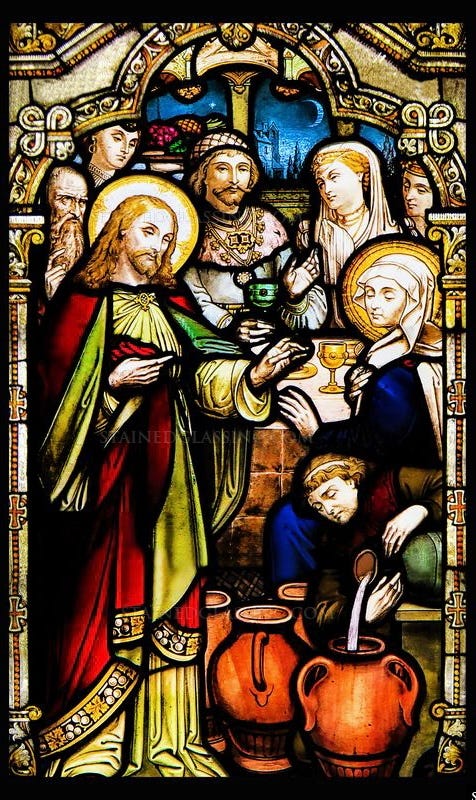Wedding at Cana: 6 Water Jars
John 2 v 6-8
Nearby stood six stone water jars, the kind used by the Jews for ceremonial washing, each holding from twenty to thirty gallons. Jesus said to the servants, “Fill the jars with water”; so they filled them to the brim. Then he told them, “Now draw some out and take it to the master of the banquet.”
The water jars mentioned here were used as part of ritual washing. The Jews would ceremonially wash themselves before and after every meal, when they woke in the morning and after using the toilet. There was a significant amount of hand washing during the seven day wedding feast.
Marriage and Baptism
In the marriage ceremony, the bride would have to fully immerse herself in water. This would prepare her for the bridegroom and indicate that she was no longer under the authority of her father, but her husband-to-be.
The Christian baptism appears to be linked to this part of the marriage ceremony. This suggests that when someone is baptised into the Church (Body of Christ), the person comes under the authority of Jesus, as the Bridegroom.
In this context, baptism would be instrumental in preparing the Christian for the return of Christ. Where He would claim His bride (The Church).
Six Days and Six Jars
The six jars were filled with water. This reminds me of the beginning of the Genesis 1 story, where we have water and the six days of Creation.
Genesis 1 v 2
Now the earth was formless and empty, darkness was over the surface of the deep, and the Spirit of God was hovering over the waters.
This verse fills me with expectation every time I read it. I get the same feeling in the story of the Wedding at Cana, just before the servants draw the wine from the jars.
At Cana, I get a sense that God is doing something new, something extraordinary, something hyper-natural. Who would have thought Jesus would do something as incredible as turning the water into wine. It feels to me like a new beginning, the beginning of a new Creation.
Washed in Jesus’ Blood
In this story, we see vessels of water used in ritual washing turned into jars of wine.
Wine represents Jesus’ blood. This means John is suggesting that the early Christians would be washing in the Blood of Jesus.
But how can people be washed in blood? Surely, it will make someone more unclean.
Blood was used in ancient Israelite religion to atone. Atonement means to cover. By being washed in the Blood of Christ, our sins are atoned or covered.
An alternative way of looking at this is to think of a river which breaks its banks and covers the surrounding ground. The river covers and washes away the soil.
Similarly, the way I see it, the Blood of Christ covers us and washes away our sin.



Such an interesting point about the Spirit of God moving on the face of the waters, I'll be mulling that over for a while. I think the Platonists would enjoy that symbolism connected to the jars, since they're uncomfortable with creation ex nihilo, and the jars of water are kind of like the raw material substance that they believe in. Not that I think you're inclined to such a reading... but it makes me wonder, do you have a line on why Christ has people fill the jars with water before the miracle takes place? Why not have six empty jars suddenly full, I wonder?